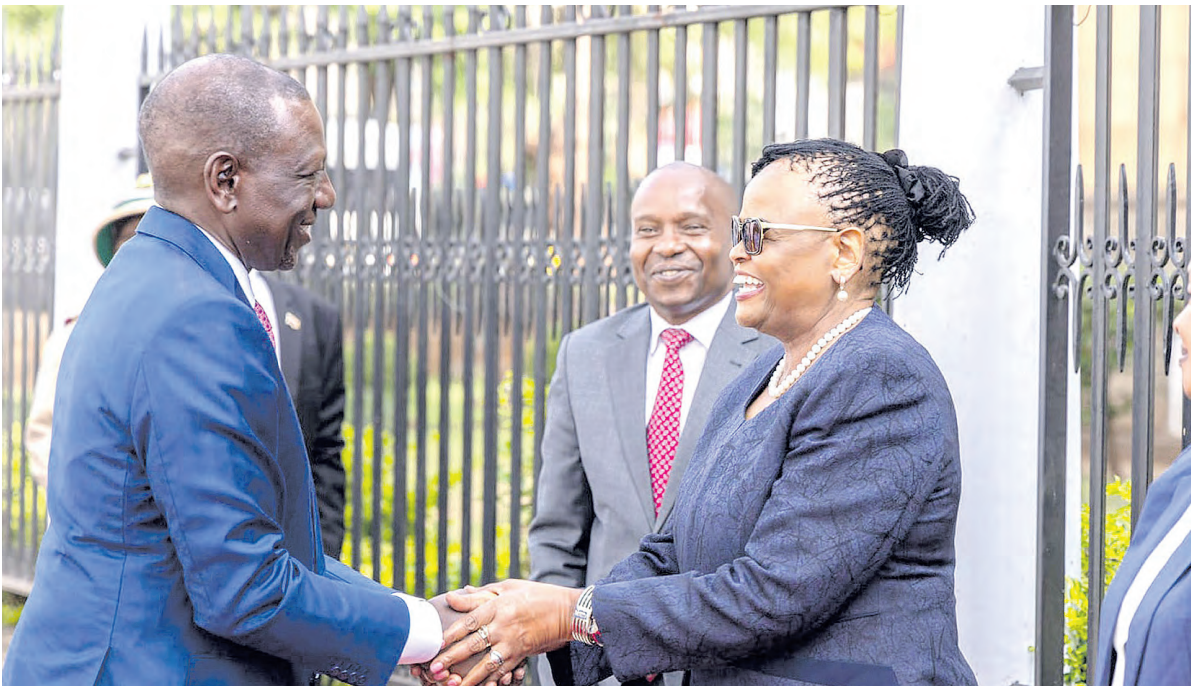

President William Ruto, his deputy Kithure Kindiki and Supreme Court judges as well as other top judges are set for a pay rise starting July 1.
Treasury documents show the President and deputy’s combined annual pay, including allowances, will increase from Sh36 million to Sh42 million, a jump of 16 per cent.
According to the figures disclosed by Treasury in the second supplementary estimates, judges’ pay will go up by about Sh500 million from the current Sh3.1 billion to Sh3.6 billion.
It remains unclear how each judge’s pay will be affected, even as salaries for the other state officers remain unchanged.
With the adjustment, President Ruto’s monthly pay could increase to Sh1.6 million from the current Sh1.4 million.
Kindiki’s pay could jump to Sh1.4 million from the current Sh1.2 million. Treasury has, however, not given a breakdown of the exact amount the two leaders would take home.
The President presently earns a basic salary of Sh866,250, Sh300,000 house allowance and market adjustment of Sh227,500 per month.
The DP is currently paid Sh736,313 basic salary, Sh300,000 housing allowance and Sh190,875 in salary market adjustment.
In June last year, SRC was forced to suspend salary increase for state officers, including MPs after the Gen Z protests.
At the time, MPs said they did not want additional pay but last month bitterly complained how they were underpaid.
The new adjustments have been proposed at a time the government has announced it will continue to trim its budgets to meet the demands.
“Fiscal consolidation will be supported by concerted expenditure rationalization and revenue mobilization efforts,” Treasury Cabinet Secretary John Mbadi said in the 2025 Budget Policy Statement currently before MPs for review.
Apart from the salary, the President and the Deputy President are entitled to of cial transport “in line with the prevailing government policy on transport.”
They are also entitled to an annual medical cover for self, their spouses, and up to four children below 25 years who are fully dependent on them.
It entails a Sh10 million in-patient cover, Sh300,000 for outpatient, Sh150,000 for maternity, with dental and optical going for Sh75,000 each.
They are also housed in an official residence with “commensurate home utilities and attendants” facilitated by the state.
The adjustments could escalate concerns about the ever-rising wage bill, with latest data showing it is gravitating towards the Sh2 trillion mark. This has been worsened by a strained revenue collection with debt taking up nearly 60 per cent of every Sh100 that Kenya Revenue Authority collects.
Kenya’s public wage bill is to the tune of about Sh1.7 trillion, up from Sh1.1 trillion that was reported in the 2022-23 financial year.
Civil servants, estimated to be 232,000, as well as doctors, teachers, and other health workers have been agitating for salary reviews lately, citing the high cost of living.
MCAs and county assembly speakers have renewed their push for more perks and plan to confront Ruto with their demands at a conference planned for next month (see separate story).
They are demanding increased their salaries and the reinstatement of the plenary sitting allowance that was scrapped by the Salaries and Remuneration Commission.
The over 2,000 ward reps also want the state to introduce a pension for them, similar to that of the MPs and senators in what would see the taxpayers fork out millions of shillings.
“MCAs do not have pensions. We are fathers and mothers. We have people to look after when we retire,” Kwale county assembly majority leader Halifa Mwajirani said in Nairobi on Wednesday.
Treasury has over time given reasons, among them missed revenue collection targets and debt repayment pressure, when declining pay raise requests.
In the lead up to the 2023-24 budget, however, Treasury indicated that it had allocated Sh17 billion to adjust civil servants’ pay.
In September last year, the Public Service ministry said that the new rates – from the second collective bargain agreement with the Union of Kenya Civil Servants -were to take effect.
Treasury has been grappling with the bloated wage bill, even as SRC keeps receiving requests for salary adjustments from public institutions.
Treasury data further reveals that pension expenses are set to increase by Sh11 billion starting July in what highlights the government’s burden in making civil servants comfortable in retirement.
The amount will jump from the present Sh223 billion to Sh234 billion – which translates to about 5 per cent.
Ordinary pension is set to increase from Sh93 billion to Sh100 billion, while civil servants exiting during the period under review would take home Sh93 billion in gratuity.
The highest jump would be for military personnel whose gratuity payments are set for a jump of about Sh13 billion.
Treasury has budgeted Sh34 billion for contribution to the civil servants’ pensions scheme even as gratuity payouts for civil servants are lower by Sh7 billion.











